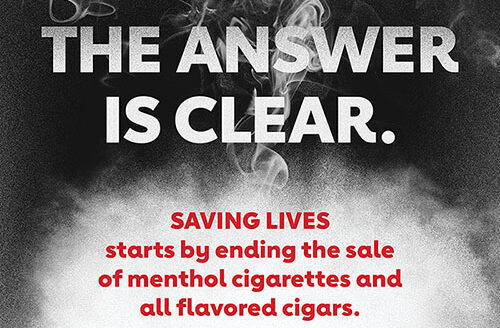Frontline Blog
Big city health officials push Biden Administration to eliminate menthol cigarettes
March 2024

Washington, DC—The Big Cities Health Coalition is urging the Biden Administration to complete its review of the Tobacco Product Standard for Menthol in Cigarettes (menthol cigarette rule) and to allow it to be issued in final form without delay.
This is part of an ongoing effort by big city health leaders to encourage restriction of menthol product sales nationally (see timeline below). Health officials are particularly concerned about the role menthol cigarettes play in making smoking appealing to youth (which leads to initiation) and the substantial harm the products have caused to Black Americans in particular.
A federal ban would have a much more significant impact than a local ban. It would help protect the health of people throughout the country, particularly in those communities that are preempted from regulating tobacco and in those where it is too challenging politically to impose these types of restrictions.
Minneapolis Health Commissioner Damōn Chaplin
“For more than 60 years, the tobacco industry has targeted Black Americans, as well as youth and LGBTQIA+ populations, with marketing and price promotions for menthol cigarettes,” said BCHC Executive Director Chrissie Juliano, MPP. “Cities have led the charge in the fight against flavored tobacco products, but stopping menthol cigarette sales is really something that must be done nationally in order to protect all Americans from the danger of tobacco-related disease. Ending menthol sales will save thousands upon thousands of lives, particularly Black lives. It is also the Administration’s only hope to truly achieve their cancer moonshot goals.”
Minneapolis Health Commissioner Damōn Chaplin noted that while his city has restricted menthol sales since 2018, federal restrictions are still critically important. “A federal ban would have a much more significant impact than a local ban. It would help protect the health of people throughout the country, particularly in those communities that are preempted from regulating tobacco and in those where it is too challenging politically to impose these types of restrictions.”
City of Columbus Health Commissioner Mysheika Roberts, MD, MPH, agreed that federal restrictions are the right choice for public health. “These flavored tobacco products are the gateway to a lifetime use of tobacco products, which comes with medical issues that need to be addressed and shorten the life expectancy. So we urge the Biden Administration to keep Americans safe from the dangers of menthol flavored tobacco nationwide.”
TIMELINE: Big city health leaders push for federal menthol restrictions
Washington Post: Health care should focus not on choices made but on choices available (letter to editor from Columbus and Cleveland health commissioners)
BCHC joins 79 national public health groups to voice full support for federal menthol restrictions in a full-page Washington Post ad
BCHC letter to OMB (linked above)
Washington Post: Biden ban on menthol cigarettes to be delayed amid political concerns, officials say
ABC News: Biden Administration pulls back from banning menthol cigarettes
NBC News: Biden Administration delays ban on menthol cigarettes until 2024
The Hill: Public health groups alarmed at White House delay of menthol cigarette ban
National Journal: Menthol ban divides health, criminal-justice advocates
Washington Post: White House weighs menthol cigarette ban
BCHC holds press briefing – hear audio clips on Public Health Review Morning Edition
Washington Post: Banning menthol cigarettes (letter to editor from BCHC executive director)
NBC News: Ohio reverses local flavored tobacco bans, infuriating doctors
BCHC joins 123 organizations to voice full support for federal menthol restrictions in a full-page Washington Post ad and joint statement
The Mercury News: Black lives suffer as feds delay menthol cigarette action (op ed co-authored by County of Santa Clara Public Health deputy director and San Jose/Silicon Valley NAACP president)
Washington Post: Biden administration delays menthol cigarette ban again amid political concerns
About the Big Cities Health Coalition
The Big Cities Health Coalition (BCHC) is a forum for the leaders of America’s largest metropolitan health departments to exchange strategies and jointly address issues to promote and protect the health and safety of their residents. Collectively, BCHC member jurisdictions directly impact more than 61 million people, or one in five Americans.


